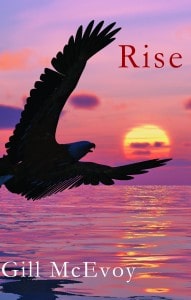The Plucking Shed, 2010. Cinnamon Press. Rise, 2012. Cinnamon Press.
To survive cancer, as this poet has done, and to write about the experience without fear or bitterness is remarkable, and yet life’s journey is not necessarily laden with gilded ornaments, rousing sex, and unforgettable adventure. No, it is most frequently a harrowing experience the older one gets. Gill McEvoy was born in 1944, when the buzz bombs from Germany were wreaking havoc and despair although it was well seen to be the last maniacal act of Britain’s greatest European antagonist of the twentieth century. As an adult, McEvoy endured a problematic marriage to a violently ill man, raised their children, saw her husband die and leave her with the domestic mess, as it were, to clean up. On top of that, she then became sick herself, but now – approaching seventy – she has come out on top of her troubles. Or so one gathers from these two collections of verse.
McEvoy’s poems, collected late in book form, are not only statements of fact to her readers but reminders to her (now grown) children that the poet endures not without effort. More than that, an intelligent good will marks both of these books, published within two years of each other. She makes art from the quotidian elements of her life, and we see that a British woman’s life is no different in essence than someone working hard in Salt Lake City or in Winnipeg, in Warsaw or down in Rio. From The Plucking Shed, here are the opening and closing stanzas of “Preparing Fish”:
I have lived inland all my life,
got no further than sticklebacks
glowering in jars,
never once ate trout.
Here in my new kitchen
this strange fish slips from my grip,
slithers and slaps against the sink.
It smells of foreign things.
—————
When you walk in – starving, as you say –
you find me lining out the frail specks
of starlight on the drainer’s edge.
The recognition of effort in daily life, not slothfulness, even after the anxiety and physical pain of a bout with cancer, is what informs McEvoy’s poems. This is not a diction borne of dilettantism or overly cerebral mirages. Neither is it conscious of itself entirely, either. The poet can be blunt as well, as in these final lines from “Message to the Well-Meaning”: “So // the next person to come along and say, Think positive, and all that sort of crap / will get it right between the eyes. / For I’m a hard woman now; / I am diamond, carborundum, / and I wipe out fools.” Now, can you argue with that? I can’t, and I only remark that putting frustration into a succinct, “in-your-face” poem meant to be both serious and good-humored is what all poets and artists – those who create something from supposedly nothing – strive for constantly.
Rise is more concisely ordered in some ways than The Plucking Shed, but no less vivid and memorable in facing quandaries and uncertainties. For McEvoy, observing – for that is all one should do – natural life, not wrought with human structures but certainly so affected – is what makes her life bearable, or at least that’s the message throughout these poems, succinctly crafted, sculpted (as Sigrid Bergie might say), to fit recognition, understanding, and in the end our admiration. Here is the entirety of “Magpie”:
Outside my window
he’s a pure sun in an aura of black.
Brilliance pings from his feathers,
blinds me, shrinks my room
to zero.
Later in this second collection, there is the “Nuala” sequence, about a small girl in her mother’s company who is learning the limits of what she can have and experience. McEvoy captures this frustration convincingly, as in the opening lines of “The Balloon Man” – the child doesn’t see danger, but her mother does:
She stops to look at the man
twisting balloons into animal shapes.
She tugs her mother’s arm:
What? Snaps her mother whose mind’s
on shopping and the fearful price
of children’s shoes . . . .
McEvoy also plumbs the vortex of a single woman living alone – more than just an empty nest “syndrome” but both a horror and a freedom, as if leaving her house and just walking in the woods for a spell, not being home, could alarm the neighbors. The sequences of “Almond Street” poems evoke this plurality of oneness very well, at least to this critic’s American sensibility.
In sum, then, both The Plucking Shed and Rise give ample testimony, if such could be said, of a significant poet – Gill McEvoy – living in non-London England, one who has married, raised children to adulthood, been widowed, survived cancer – at least for now – and has written masterfully about her life and those of others, characters in a novel or play of poetry – for that’s what good depictions are, essentially: how to describe this journey of life from childhood through adulthood and trying to keep death at bay, and writing delicious poems not always mellifluous or delicate, but facing difficulties head on. Would that we all had such courage!

